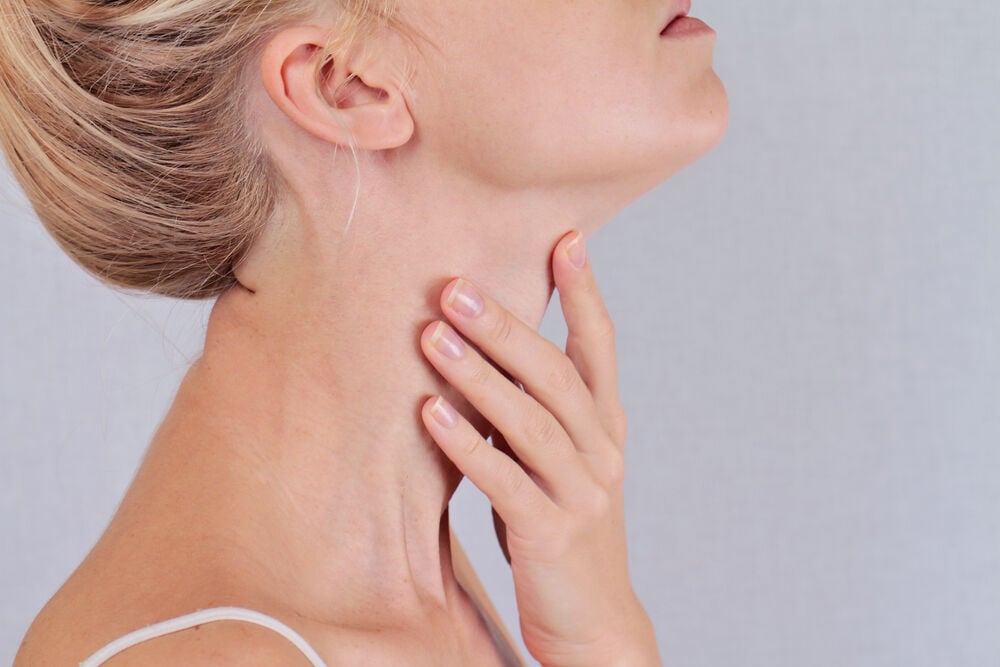Hashimoto’s thyroiditis is an autoimmune disease of the thyroid gland. The thyroid plays an important role in many of the body’s functions, and Hashimoto’s disease can have serious consequences. Keep reading for a complete guide to the condition, symptoms of Hashimoto’s disease, and treatment options.
-
Tracking cycle
-
Getting pregnant
-
Pregnancy
-
Help Center
-
Flo for Partners
-
Anonymous Mode
-
Flo app reviews
-
Flo Premium New
-
Secret Chats New
-
Symptom Checker New
-
Your cycle
-
Health 360°
-
Getting pregnant
-
Pregnancy
-
Being a mom
-
LGBTQ+
-
Quizzes
-
Ovulation calculator
-
hCG calculator
-
Pregnancy test calculator
-
Menstrual cycle calculator
-
Period calculator
-
Implantation calculator
-
Pregnancy weeks to months calculator
-
Pregnancy due date calculator
-
IVF and FET due date calculator
-
Due date calculator by ultrasound
-
Medical Affairs
-
Science & Research
-
Pass It On Project New
-
Privacy Portal
-
Press Center
-
Flo Accuracy
-
Careers
-
Contact Us
Hashimoto’s Disease: Everything You Need to Know


Every piece of content at Flo Health adheres to the highest editorial standards for language, style, and medical accuracy. To learn what we do to deliver the best health and lifestyle insights to you, check out our content review principles.
What is Hashimoto’s disease?
An autoimmune disease is when the body mistakenly attacks its own tissues. This occurs when the immune system thinks its own tissue is a foreign invader. In 1912, Japanese physician Dr. Haruko Hashimoto first discovered a particular autoimmune disease in which the body attacks the thyroid gland tissue. The condition was named after him: Hashimoto’s thyroiditis. Hashimoto’s disease is also called autoimmune thyroiditis or lymphocytic thyroiditis.
Hashimoto’s thyroiditis is the most common type of hypothyroidism in the United States. It’s also the most common cause of hypothyroidism in iodine-sufficient areas of the world. Hypothyroidism is a condition of an underactive thyroid.
Women are much more at risk for Hashimoto’s thyroid disease, with a 7:1 ratio of women to men with the condition. The peak age that women develop the condition is between 30 and 50 years old. Almost 10 percent of the global population experiences thyroid failure. The risk for the disease increases with age.
Individuals with Hashimoto’s disease experience gradual thyroid failure. In some cases, a goiter will form on the neck. Almost all patients with Hashimoto’s disease have high concentrations of antibodies against one or more thyroid antigens.
What is the thyroid gland?

Take a quiz
Find out what you can do with our Health Assistant
The thyroid gland is part of the endocrine system. This system produces hormones that regulate growth and development, metabolism, tissue function, sexual function, reproduction, sleep, and mood. The thyroid gland secretes hormones that regulate how quickly and efficiently cells convert nutrients into energy, also known as metabolism.
Symptoms of Hashimoto’s disease
There are no symptoms that are unique to Hashimoto’s disease; most of the symptoms are usually due to hypothyroidism. The condition typically advances slowly over several years, so individuals are often completely unaware they have the disease. As it develops, Hashimoto’s symptoms will start to appear. A goiter is often the initial sign of the disease.
Over time, other symptoms of a Hashimoto’s flare-up may appear, including:
- Fatigue
- Constantly feeling cold
- Weight gain
- Puffy face or eyes
- Constipation
- Muscle pain and stiff joints
- Depression
- Thinning hair or hair loss
- Dry skin
- Irregular or heavy periods
- Fertility issues (for women)
- Memory problems
- Difficulty concentrating
- Slow heart rate
Symptoms typically get worse over time.
Causes of Hashimoto’s disease
Hashimoto’s disease is an autoimmune disorder, which is essentially when the body turns against itself. The immune system sends antibodies to damage your thyroid gland, thinking it’s a foreign object.
Scientists still don’t completely understand why this occurs. Some researchers believe that bacteria or a virus causes the response, while others think it’s genetic.
Sex, heredity, and age all play roles in an individual’s risk of developing the condition.
In recent years, there have been a lot of conclusive findings surrounding genetic susceptibility to Hashimoto’s disease. The following observations have been made:
- The disease is prevalent in families. Sometimes, a family grouping will be at risk for both Hashimoto’s disease and Graves’ disease.
- Individuals with Down syndrome and Turner syndrome are at an increased risk of developing Hashimoto’s disease.
- There is a sibling recurrence risk of more than 20 percent.
- The concordance rate in identical twins ranges from 30–60 percent.
Additional susceptible factors
Infection
There’s no evidence yet that suggests an infection can cause Hashimoto’s thyroiditis.
Stress
There is speculation that stress can be a factor in Hashimoto’s disease, but there is no concrete evidence linking psychological or emotional stress to the condition.
Gender
Women are much more likely to develop Hashimoto’s thyroiditis than men, suggesting that sex hormones may play a function in the condition. A particular gene – FOXP3 – has been linked to autoimmune thyroid disease, and this gene is only on the X chromosome. Because women have two X chromosomes and men only have one, this may explain why Hashimoto’s disease is more common among women.
Pregnancy
Some women develop postpartum Hashimoto’s thyroiditis. This could be due to an increase in T cells during pregnancy. This increase causes diminished function for both B cells and T cells. As the body tries to rebalance after a pregnancy, immunosuppression is thought to contribute to the development of Hashimoto’s disease.
Iodine intake
A mild iodine deficiency is linked with a lower risk of Hashimoto’s thyroiditis. Conversely, there is a link between an excess of iodine and a higher prevalence of the condition. This theory is further supported by the fact that medications containing high concentrations of iodine often cause autoimmune thyroiditis.
Radiation exposure
Some research suggests that radiation exposure can increase the risk of developing autoimmune thyroiditis. For example, after the nuclear disaster in Chernobyl, there were unprecedented rates of children developing thyroid autoantibodies. However, long-term follow-up with atomic bomb survivors has shown no increases in autoimmune thyroiditis.
Hashimoto’s disease vs hypothyroidism
Your doctors may want to check for Hashimoto’s disease if you have a goiter, low thyroid hormone levels, fertility issues, and/or repeated miscarriages. Your doctor may perform blood tests to look for thyroid antibodies.
With time, Hashimoto’s disease can damage the thyroid gland so much that hypothyroidism occurs. Hypothyroidism is when the body doesn’t produce enough of the thyroid hormone to meet the body’s needs. Symptoms of hypothyroidism can include feeling cold, loss of appetite, weight gain, dry skin, hair loss, fatigue, depression, heavy periods, and high cholesterol. Hashimoto’s disease can lead to Hashimoto’s hypothyroidism.
Sometimes, Hashimoto’s disease will cause goiters. If the goiter grows unusually large, it can make it difficult to swallow. If this happens, surgery may be required to remove some or all of the goiter.
Treating Hashimoto’s thyroiditis
Once Hashimoto’s disease is confirmed, a doctor will monitor the patient to ensure the condition doesn’t advance. If hypothyroidism develops, the patient is prescribed a thyroid medication that acts as a synthetic thyroid hormone. Pregnant women showing signs of hypothyroidism will immediately require medication.
New research into treatment options
In 2019, Norway’s Telemark Hospital began a study of thyroidectomies (surgical removal of the thyroid) on patients with Hashimoto’s disease. The study included 147 enrollees, with 73 individuals having the surgery. The results after surgery were promising. Individuals reported an improvement in their quality of life and a decrease in fatigue.
This study could be a hopeful indication of a solution. However, the study only looked at a small number of patients, and more research is necessary.
Additionally, surgery may not be a perfect solution. Thyroidectomies are a complicated surgery with risks of damage to the parathyroid glands and laryngeal nerve. Without a thyroid, patients who have had the surgery will have to rely on thyroid medication for the rest of their lives.
Hashimoto’s disease and iodine
The thyroid gland needs iodine to make thyroid hormones. However, people with Hashimoto’s disease may be sensitive to large amounts of iodine. Eating too many iodine-rich foods or taking iodine supplements can trigger hypothyroidism in some people. Talk to your doctor about any iodine supplements you take.
Pregnant women need more iodine in their diet to nourish their baby. However, taking too much iodine can have negative consequences, such as a goiter in the baby. Talk to your doctor about how much iodine you should take during pregnancy.
When to see a doctor
It is advised to see your doctor if you’re noticing these signs:
- Frequent tiredness
- Pale and puffy face
- Dry skin
- Constipation
You will need frequent follow-up testing of your thyroid function if you’ve previously had thyroid surgery; take medications with radioactive iodine; or have had radiation therapy to your neck, head, or upper chest.
Wrapping up
Hashimoto’s thyroiditis can be a complicated condition. It often sneaks up on people, taking many years to show signs. If not monitored, Hashimoto’s thyroiditis may result in hypothyroidism or other complications. Keep your doctor informed and watch for symptoms so you can catch the condition early.


Hey, I'm Anique
I started using Flo app to track my period and ovulation because we wanted to have a baby.


The Flo app helped me learn about my body and spot ovulation signs during our conception journey.


I vividly
remember the day
that we switched
Flo into
Pregnancy Mode — it was
such a special
moment.
Real stories, real results
Learn how the Flo app became an amazing cheerleader for us on our conception journey.




